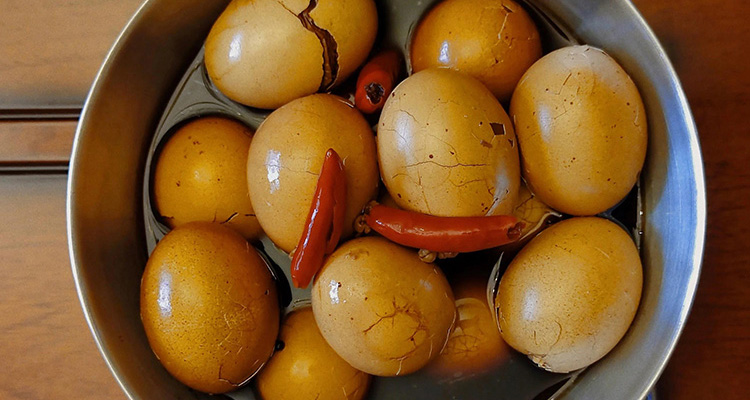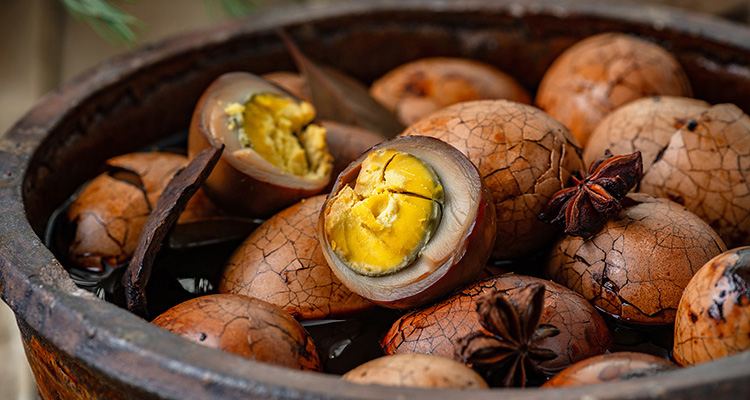Tea Egg — A Classic Beijing Braised Egg Snack
Walking through the hutongs of Beijing, you can always catch a unique aroma blending the freshness of tea with rich spices. Follow the scent, and you’ll find a street stall with a large pot of reddish-brown braising liquid, in which eggs covered with crackled patterns are gently simmering. This is the Tea Egg, one of the most familiar street snacks in Beijing.
1. Origin and History
Tea Eggs can be traced back to the Ming Dynasty in the Jiangnan region and were brought to Beijing by Han migrants during the Qing Dynasty, forming a local specialty. Originally invented to avoid wasting cracked eggs, they became a convenient snack loved by students and office workers.
2. Cultural Significance
For Beijingers, Tea Eggs are warm memories woven into everyday life. A hot tea egg before school, tucked secretly into a pocket to keep warm during class, or picked up on the way home from work — the few yuan spent for this small joy reflects the practical and simple wisdom of Beijing people.

3. Ingredient Highlights
Spices include Sichuan peppercorn, star anise, and cinnamon. A little rock sugar and light soy sauce are crucial to create the beautiful amber color and a balanced sweet-salty flavor.
4. Preparation Process
First, boil the eggs until cooked, then gently crack the shells evenly without breaking them apart. Wrap the tea leaves and spices in a cloth and add them to the eggs in the master stock, simmering over low heat for more than two hours.
5. Flavor and Texture
When the shell is peeled, the aroma of tea instantly rises. The egg white is springy and flavorful, carrying the fragrance of tea and the complex taste of spices. The yolk is exceptional — soft yet slightly crumbly, infused with the essence of the braising liquid, offering a balanced sweet-salty taste with a long.

6. How to Eat It
Tea Eggs are best eaten warm. Take small bites of the white to enjoy the tea aroma, then savor the yolk’s creamy texture. Connoisseurs often pair them with millet porridge or soy milk, as the mild grains enhance the rich flavor of the egg.
7. Recommended Places
Some of the best places to try Tea Eggs in Beijing include Huguosi Snacks (traditional master stock), Zi Guang Yuan (unique spice mix), street breakfast carts (authentic local vibe), and Old Tea Houses (excellent with tea). Prices are about 2–4 RMB each.
8. Travel Tips
In English, it’s called “Tea Egg”. The best time to enjoy it is in the morning (6:00–9:00) or afternoon (3:00–5:00 pm), when the eggs are freshest and most flavorful. Vegetarians can safely eat them, as no meat is used in the braising process.
9. Easy Home Version
You can also try making them at home: boil the eggs and crack the shells, then cook with water, soy sauce, tea leaves, star anise, cinnamon, and rock sugar. Simmer for 1 hour over low heat, then soak overnight.
when you gently peel the shell and see the marble-like tea patterns in the egg white, you’ll understand the saying “extraordinary in the ordinary.” Don’t forget to pair them with a cup of light tea and savor this blend of tea aroma and egg flavor, capturing the essence of the ancient city.


